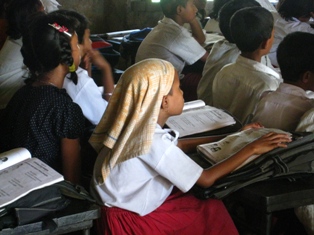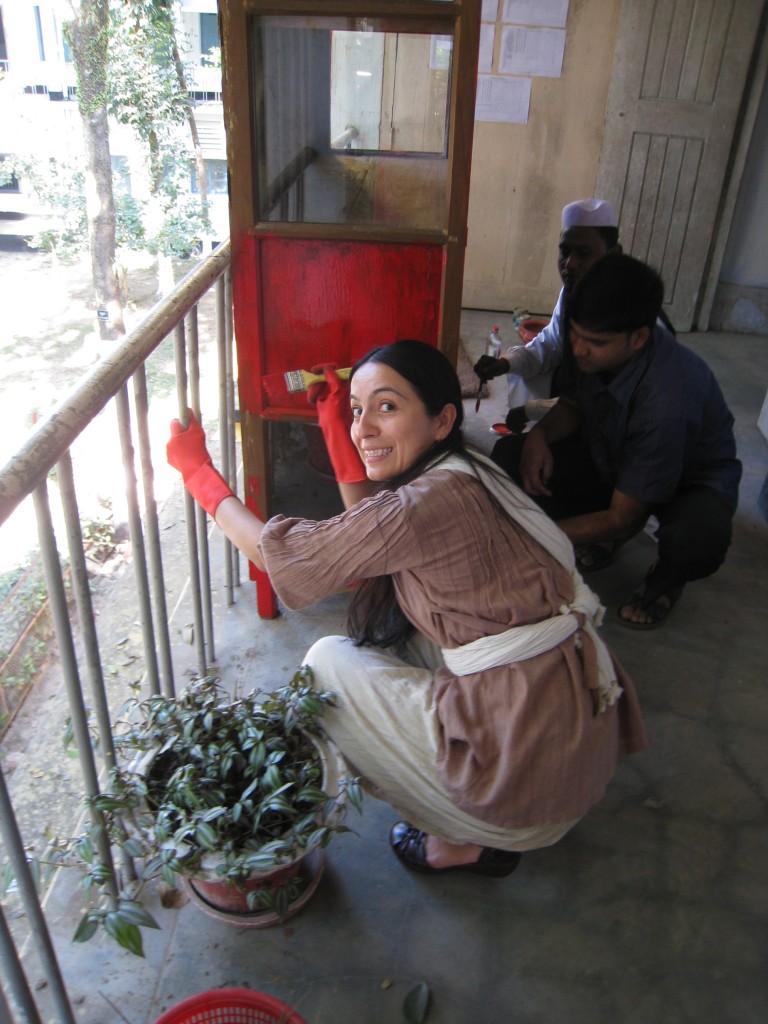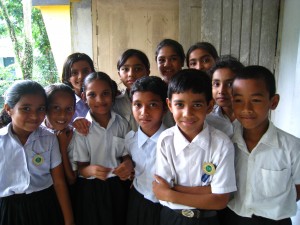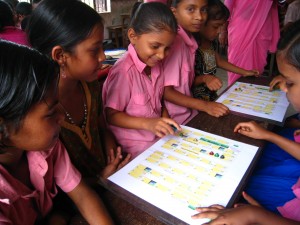Carola is a PhD candidate in Australia who hails from Chile by way of New Zealand with a lot of travelling to other places in between. With that string of countries attached to her history, you can see why she fits in beautifully here on Femina Intrepida. Plus, I’ve known her for quite a while and we’ve been in the teaching trenches together so, I knew she’d be an interesting person to interview. After completing her Masters in Development Studies Carola set off to work with AusAID and UNICEF in Bangladesh and has some great insights for us about working in development and what it was like for her out in the field.
Can you tell us what kind of work you were doing in Bangladesh?
I worked as an ELTT, English language teacher trainer at the Sylhet Primary Teaching Institute in Sylhet, Bangladesh. This project was part of the PEDP II (Primary Education Development Programme, phase 2), a sectoral programme funded by the government of Bangladesh and a consortium of bilateral and multilateral donor agencies. It was implemented by the Directorate of Primary Education of Bangladesh in partnership with Unicef Bangladesh so I technically reported to Unicef. The part of the programme I was part of was funded by AusAID.
Can you tell us a little bit about your background and what led your interests towards working in Bangladesh?
I started off as an English teacher, having done a BA Honors in English Linguistics and Literature in Chile, and a CELTA certificate in New Zealand. Through my experience working in various educational sectors, both public and private, my interest for cultural diversity and international development became a passion. This took me to do a MA in Development Studies at the University of Auckland. I choose to write my thesis on international labour migration in Bangladesh – a policy study – as I wanted to explore an area other than education to expand my knowledge and experience a different field. This research led to other projects in other areas such as the garment industry, civil society in migration policy, female migration, remittance policy and refugee (Urdu-Speaking / Bihari community) policy, all in Bangladesh. I was actually in Bangladesh three times before I took up this assignment, the first time under an Auckland University research fellowship, the second time gathering data for my own MA research, and the third time as a SAMReN (South Asia Migration Research Network) research fellow under the sponsorship of the DRC-RMMRU project (Sussex University Development Research Centre and a research unit, part of the University of Dhaka) in Bangladesh. So when it came to applying for the position, I felt I made a strong candidate.
How did you find the job and what sort of hoops did you have to jump through to secure the position?
I found the position on a website called ‘Australian Council for International Development’
. I cannot remember details of all I needed to prepare as this is a while ago but I remember having to prepare a lengthy essay-like document addressing questions specific to the assignment. I had 2 telephone interviews, one with the programme coordinator and another one with a psychologist. I also needed to have a pre-departure medical check-up, get all the relevant immunizations and attend a pre-departure briefing.
What can you tell us about the place you were in?
I was in Sylhet for a year. Sylhet is a big city in the Northeast part of Bangladesh. I chose this place deliberately because it is much less densely populated than Dhaka, and I also knew it was much greener and quieter than many places in Bangladesh, which I found to be true. There was not much in the way of amenities though, as I had anticipated; a few shopping malls but that was about it. There were a few restaurants and tea houses. But to be fair, I did not really explore all that is available in Sylhet as I was busy with my work and doings with the people I met. I had a lot of fun spending time with my colleagues, trainee teachers and the children. The main reason for me to choose Bangladesh was its proximity to tea gardens and forests, also to the border with the NE Indian state of Meghalaya, a place I really wanted to see. I knew I could travel there by land, which made Sylhet a strategic point. It was like working in one country and going to another almost every 2 weeks.
It’d would be interesting to know what your days were like. Can you give us some details?
Every day was different, and I was lucky I could choose to have my days this way as I was totally free to follow Unicef guidelines or adapt and do what you thought would work better, what was more feasible. I was not the only one – there were another 11 teacher trainers spread out in the country, but I was alone in Sylhet. Ideally, they were looking at placing 1 teacher trainer in each city, but it did not work out that way. So I did have contact with other colleagues and we would catch up from time to time. To get back to your question, an example of a typical day was teaching /training of trainee teachers in the mornings. There were around 350 of them so I divided them in batches and we had a time-table with fixed slots allocated to each batch. Then it was meeting my counter-part to talk about our schedule, updates, changes or cancellations of our activities. I would back home to my hotel for lunch as I cooked my own food. I would return in the afternoon to observe teacher trainers at different local primary schools and spend some time observing their realities, which I found to be quite different, according to location and also the background of principals and teachers, as in, some were mixed, some had a Muslim majority, some had a Hindu majority. There was also the experimental school, which was part of the PTI. Here the children seemed much better off than any of the other schools I visited, for some reason. Sometimes I would travel back to the PTI with the teachers I had observed or if that was not possible, we would meet the next day for a feed-back meeting. I always prepared a printed feedback report, which they really appreciated because it made it a more formal evaluation of their work.
Once at home I would work on more planning and would design activities and materials. I would speak with my counterpart at lot. He was simply wonderful, he was my guide to stepping into the heavily politicized world of a public educational institution in Bangladesh. He was also very open to learning and implementing whatever I could pass on in his lectures.
You often hear people talking about how sometimes it’s nice to be able to let off steam with others from a similar culture to your own when living abroad for a long time. Were there many other non-Bangladeshis in your area that you communicated or collaborated with and, if not, was there ever any sense of isolation? If so, how did you deal with this?
I actually never saw any other foreigner in Sylhet, except once, when I spotted a Korean-looking couple travelling on a rickshaw in the opposite direction. I got so excited and wanted to jump off my rickshaw to speak with them, but it was really crowded and I lost sight of them. The other times when I interacted with other foreigners, were my colleagues and friends who came to visit, and my boss who came for a programme evaluation once. I did feel isolated but I occupied myself with my work, I also spoke to a few close friends on the phone and on Skype. I have a few close friends in India too, who were a big support because they kept an eye on me and invited me to join them in different activities often, especially in Shillong. I also should not complain about isolation because people around me were so incredibly caring and generous to me. My counterpart, colleagues and trainer teachers were always excited about me joining them for meals, tea, coffee and events. I did visit some of them in their homes. People in Bangladesh are extremely hospitable, that is something everybody should know about.
But I am sure those of you who have lived overseas, in a culture that is very different to what you are used to, and where you try to interact in a language that you barely master, understand that no matter how caring the people around you are, eventually you need an escape to a comfort zone, and that was India for me, that was Shillong. I would look forward to being back each time because it was always such a liberating experience in every way; culture, environment, language, even changing dress code felt so great, leaving the salwaar kameez and putting a pair of jeans and T-shirt on felt like an absolute luxury. But I think this need for a dress code change was symbolic and came from living in the environment I was in; Sylhet is the most orthodox place in Bangladesh, so I always felt quite conscious about what I wore, how I behaved and what I said. I needed to be mindful and careful and could not afford to make mistakes. There are a lot of political, cultural complexities, which you need to negotiate day to day and walk the path very cautiously. I could write on and on about this but I guess that is for another time.
Oh, yes! Please come back and tell us more. In the meantime, what were some of the highlights and low points of the experience?
Low points: isolation, loneliness, not being able to speak Bangla, weather (it is very hot and humid in summer), how much attention you draw whatever you do. I started off exploring and walking into tea houses just for the experience, but over time I felt this behavior was far too unusual for locals to understand so I started to keep a much lower profile. Also the absence of public spaces where women can act freely, the access of parks or areas where you could walk or exercise, the politics of the country and the place I worked in, which did not affect me but did many people I cared about; the frustration of not being able to do more to help.
Highlights: hard to quantify them because there were so many, the sheer learning, the witnessing of so many instances in people’s lives, the children, the teachers, their hard work, their spirit, their dreams, the progress you see, the changes you may help to bring about, the celebrations, the laughter, the friends I made, the wonderful opportunity I had to interact in an environment where you learn so much, my colleagues, their stories and inspiring lives, the feeling of accomplishing something, however little, is still something. This is something that took me a while to come to terms with because when I finished my assignment, I left with the feeling I had not done enough, or how differently I could have done things, but time brings a better perspective to see things from. I also keep in touch with my counterpart and some trainee teachers; some are overseas some still in Bangladesh, but all of them have moved up in their careers, which makes me very happy.
Any final words for us?
Whatever I was able to do it was because of the wonderful support I had from my counterpart, colleagues and trainee teachers, who were keen to make the most of the opportunity for learning my presence brought. Working within sectorial programmes is complex, because you are working to achieve quantitative outcomes in a fixed period of time, which is an extremely difficult thing to do leading to sometimes unintended consequences, especially in education.
Many thanks for giving us some insider’s knowledge on your experience, Carola. Good luck with your PhD!

If you have any questions for Carola, please ask away in the comments below and if you’ve had a similar experience and would be willing to talk to us, please get in touch as we are always looking for new stories about the lives of Femina Intrepida.




Leave a Reply